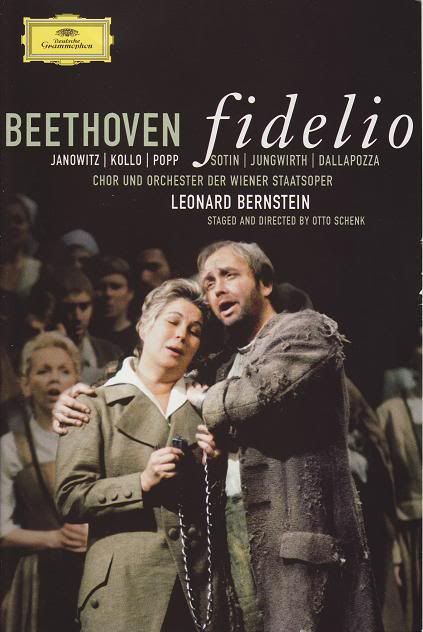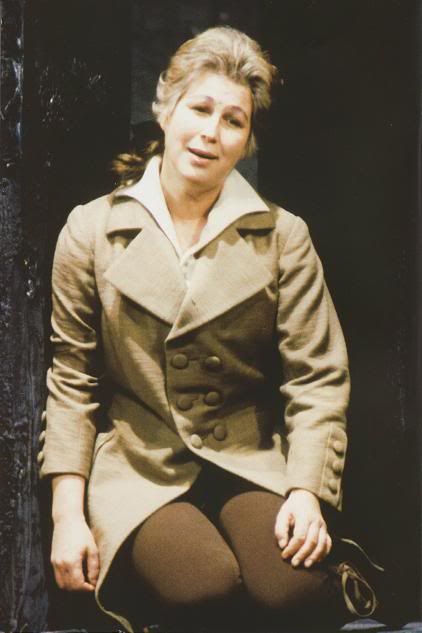Whenever you read about Fidelio, it is invariably followed by the words "Beethoven's only opera." For years I thought the piece was titled Fidelio, Beethoven's Only Opera. Just kidding.
Recently a friend sent me a wonderful gift: a DVD of a live performance of Fidelio. I am embarrassed to admit that I had never even heard the music, much less seen a performance. Well, this DVD has filled the deficit, and in a thrilling way.
This is more than only a splendid production, but it is that. What an eye-opener for me.
The story takes place in Beethoven's own time, the early 19th century. I'll simply copy the program notes from the booklet accompanying the DVD:
Leonore, wife of the high-born Spanish state official Florestan, believes that his sudden disappearance two years earlier was the result of political machinations which he was determined to expose. Florestan's friends, among them the Minister of State Don Fernando, are convinced that he has been murdered by his enemies, but Leonore refuses to accept this, despite its near certainty, and goes in search of her missing husband.
The few remaining clues have led her near Seville, to a state prison, whose governor is Don Pizarro. Leonore suspects that it was Pizarro's crimes that Florestan was intending to reveal. With no one to help her, led by instinct, courage and her unshakeable love for Florestan, she has managed to gain admittance to the prison: disguised as a young man, named Fidelio, she has persuaded the jailer Rocco to take her on as his assistant.
That is not, of course, the end of the story. Leonore/"Fidelio" insinuates herself into the confidence of the jailer, Rocco, and eventually manages to free her imprisoned husband, whom Don Fernando marked for death, as well as other political prisoners in the stony depths of the underground cells.
I've often heard and appreciated Gundula Janowitz on recordings; Karajan cast her several times. But it never got through my head that she was an opera star, a singing actress. Probably her voice was a little past its prime in this 1977 staging, but it is still fine, and she characterizes the role movingly.
I've also heard René Kollo (who plays Florestan) on recordings, never saw him. He, too, is impressive as the devastated prisoner who is on the verge of his last breath, resigned -- perhaps -- never to see his loving wife again. The supporting roles, including Lucia Popp as Marzelline, the jailer's daughter, are well sung and played.
Leonard Bernstein conducted this performance in Vienna. I've always found him exhilarating and annoying in almost equal measure. His immense musical talent can't be denied, and sometimes it works in favor of the music, sometimes only for showing off and interpretative eccentricity. This is a video, so you get to see his podium histrionics. For me, they are entertaining and sometimes enhance the mood, sometimes over the top. But I have no complaints about him here. He does the score proud.
I have to confess I've never thought much of Beethoven's music for voices. It's been a while since I've heard his Missa Solemnis, and I guess it says something that I've not been keen to revisit it. Maybe I just haven't heard the right performance. As for his famous choral finale to the Ninth Symphony, give me a break. It's high-class circus music. People go bonkers for it because of its "message."
Yet ... hearing the quartet early in the first act involving Marzelline, Leonore, Rocco, and Marzelline's admirer Jacquino, it was clear that Beethoven could command multiple voices as brilliantly as Verdi, Puccini, or ... even Richard Strauss!
It was obvious to me even on first viewing that Fidelio is a masterpiece, and not only because of its sonic beauty. I'm not an opera buff, so I could be wrong about this, but this is the only opera I know that goes beyond, way beyond, the conventions of any music drama before or since. This isn't another retelling of a story from classical antiquity, of the sort that was popular in the 18th century and well into Beethoven's time. Nor is it a melodrama of sexual passion in the later Italian/French mode.
Beethoven won't settle for that. He deals with the timeless themes of human life. Injustice. Freedom. The loyalty and love between a man and woman.
The scene where the prisoners are briefly allowed out of the dark cavernous cellar where they have been chained for what must have seemed forever to them, to briefly taste sunshine and space so long denied them before being returned to their confinement, is enough to rake your heart with pity. As is their ultimate liberation.
I emerged from this immersion into a great work of art with a new appreciation of Gundula Janowitz, René Kollo, the Vienna State Opera, and Leonard Bernstein. As well as, of course, Beethoven.
Oh, and I had never realized that the accomplished Slovak soprano, Lucia Popp -- who died long before her time should have been up -- was so cute.




1 comment:
My first acquaintance with this work was when it was used in the score of Stanley Kubrick's disastrous last film, "Eyes Wide Shut." ("Fidelio" was also the "secret password" for admission to the mysterious secret society of orgiasts that Tom Cruise crashes in the film.)
Everybody hated the score of that film with the repeated, haunting one-piano note played throughout, but I thought it was the best part of an otherwise extremely disappointing effort.
Kubrick had lost it by then.
Post a Comment